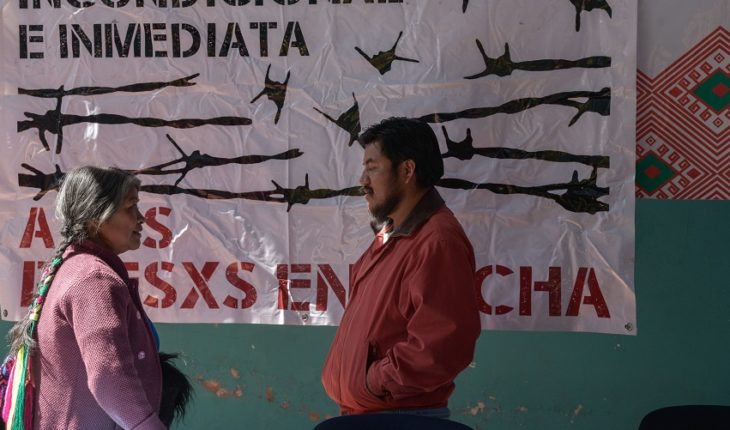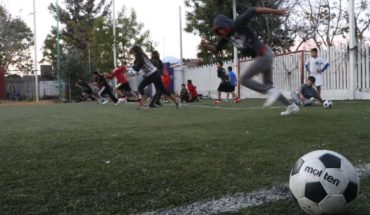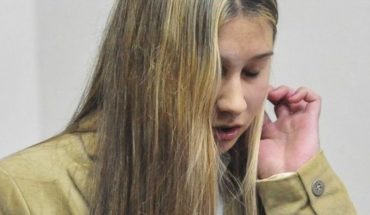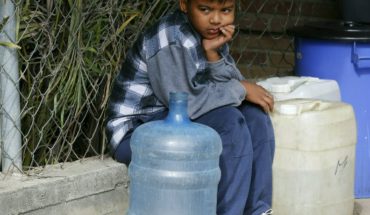The indigenous Chiapasco Juan de la Cruz Ruiz was imprisoned for 13 years of his life despite being innocent. The last four years was for a double injustice. Since February 2016, the then magistrate and current governor of Chiapas, Rutilio Escandón, signed a recommendation to release him, admitting that there were irregularities in his criminal proceedings, including torture to force him to be framed. But Escandón went on the gubernatoly campaign and the recommendation was not executed. The reasons for the omission are still unknown.
Just on December 9th Juan de la Cruz, member of the Mayan tsotsil people and originally from San Juan Chamula, Chiapas, who was accused of qualified murder and extortion, obtained his freedom.
He is one of six prisoners who remained on hunger and fasting strike for 130 days, starting on March 15, 2019, as part of the protest to demand his release, after years in which the authorities failed to heed their allegations that ministerial police men from Chiapas tortured them for days, in security houses, to force them to self-incriminate.
Find out: One year after the AMLO government, there’s still 99% impunity in torture cases, says report
The No Estamos Todos Working Group, an organization that accompanies prisoners and their families, stated that the cases of these inmates are an example of how indigenous people are incriminated and punished to reach a certain quota of detainees or to cover up the real culprits.
In all these cases, they explained, “The only evidence presented by the authorities was the defendants’ self-incriminating confession, there was no investigation. Despite that they were found guilty and have spent up to 15 years in jail.”
John spent 130 days on hunger strike and fasting, along with five other companions, lying on tarpaulins near the criminal’s nursing area. On several occasions they ended up in the hospital. But the authorities had deaf ears to all of that, something much worse in the case of John, who not only should not be in jail at the time because he was innocent, but because there was already a document that endorsed his freedom.
On 11 February 2016, the Reconciliation Bureau – a permanent body operating in Chiapas, and involving various bodies to ensure due process, respect for the human rights and individual guarantees of the accused – issued the recommendation of freedom on behalf of Juan in finding serious violations of his human rights since his arrest and throughout the criminal proceedings against him.
The recommendation was based on the booklet 387/MR/2012 and is signed by Rutilio Escandón Cadenas, then Magistrate President of the Court of Justice, and Juan Oscar Trinidad Palacios former president of the State Commission on Human Rights (ECHR), among other officials.
The recommendation was sent for processing to the Undersecretariat for Executions of Criminal Sanctions and Security Measures, which is under the Secretariat of Public Security of the state government. That instance had to issue the freedom ballot. But he didn’t, and the omission cost John three years and nine more months in prison.
The Human Rights Center Fray Bartolomé de Las Casas (Frayba), who has been defending Juan for a year, found the recommendation only on November 19 and notified the relevant authorities, including the Undersecretariat of Government and Governor Rutilio Escandón Cadenas, with the request to proceed immediately to the release of the detainee. So John finally got his freedom.
Animal Político asked the government of the state of Chiapas for an explanation of this omission, since the government secretary, Ismael Brito, met with the relatives of the prisoners on hunger strike and offered that the files would be reviewed, which never happened.
The state government’s communication area only responded that John’s omission for nearly four more years in prison should have been the responsibility of a court or court, without specifying which one and requested clarification from the Judiciary.
It replied, through its spokesperson, that the freedom recommendation had indeed existed since 2016, but that the undersecretariat for Criminal Sanctions And Security Measures was the person who was to comply with it.
The Frayba denounced the high risk to life, the integrity and personal safety of those who make up the Collective of Prisoners in Lucha and the Frayba team, who have received since November and so far in December “death threats, surveillance, harassment and intimidation”, in the context of the struggle for the freedom of prisoners of indigenous peoples, in particular the indigenous tsoltsil Juan de la Cruz.
What took John’s justice?
In 2006 Juan had a family, a companion, two daughters and one more on the way, his partner was four months pregnant. Juan also had a wool crafts business, in which he sold the pieces made by his mother and a group of women from San Juan Chamula.
Life for John was going well. But then justice crossed his path and twisted him. On 28 February 2007, Juan was arrested by state policemen and transferred to a security house, where he was tortured to self-inculate himself from a kidnapping and murder that he did not commit.
That self-indictment was based on John’s trial, which kept him in prison for almost 13 years, and for which a conviction of 30 was issued.
Because he was in prison he lost his partner, who walked away from him and could not be with his children. Just last Friday he saw them released. “I was with them for an hour. They’re teenagers, they’re 12, 14 and 16. The youngest was born while I was in prison. He wasn’t with them growing up. They got my visit well. They couldn’t believe it. Now there’s a lot to rebuild. And nothing is going to bring back the time I couldn’t give them my love, my support, my company,” he said.
John can no longer live with them because the family he had before he entered prison no longer exists. You have left to visit them from time to time.
Nor does he have his craft business anymore. His mother and siblings were in debt for paying lawyers who did nothing to help Juan get his freedom. It now also has physical aftermath from jail and hunger strike.
“I had everything, family, business, lots of dreams, they took everything from me. I left with nothing. I have to start from scratch after almost 13 years in jail. I feel very tired sometimes, but I will fight, and I will also fight for the new family i did in prison and that is still in there, my companions from the hunger strike and many others who are innocent and are there for the injustice and ineptitude of the authorities. From the outside I’m going to fight now because they’re coming out.”
What we do in Animal Político requires professional journalists, teamwork, dialogue with readers and something very important: independence. You can help us keep going. Be part of the team.
Subscribe to Animal Politician, receive benefits and support free journalism.#YoSoyAnimal
translated from Spanish: omission left indigenous Chiapanco more years in jail
December 17, 2019 |





